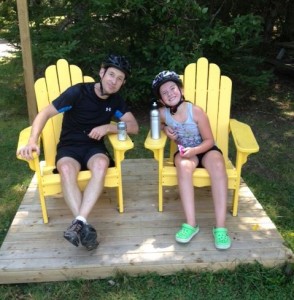My fingers dug into the smooth trunk of the beast as I searched in vain for a handgrip. I pointed my feet and dug my knees in hard, but there was no movement forward. My bare thighs quivered and locked up, victims of fear and cold. The spray from crashing waves sent icy fingers over my legs, pulling me toward the boiling stew of kelp below. Over the ocean’s roar, I heard a hiker’s desperate yell: “Keep moving! Keep MO-VING!” [read the full Facts & Arguments essay here]
Those are the dramatic opening lines from Greg Walker’s personal essay on taking risks and finding balance in life, recently published in the Globe and Mail Facts & Arguments section. A past student in both my Memories into Story courses through University of Toronto, he’s now at work on a series of essays that will form his Final Project for the Creative Writing Certificate.
I asked Greg to talk about how this essay came to be and about his writing journey so far. I hope you’ll find his words as inspiring as I do.
Off the Shelf
I’m flipping through the memories that sit in rows on the dusty shelves of my mind. They’re arranged in different boxes, like Dad’s old vinyl records in my garage. And like the albums, I never get tired of replaying the well-worn favorites. But it’s the rare surprise of rediscovering a near-forgotten one that I savour the most.
They start with the first day of school. Then waking up in the hospital after getting my tonsils out. There’s learning to ride a bike. Coke from a little glass bottle on a hot summer day. The AM radio in Mom’s kitchen pumping out 70s songs before they were classics. Terry Fox hopping down the main street of my hometown on his artificial leg.
When I was nine or ten, I got a little diary for Christmas. It was bound with green faux leather, the word “Diary” etched in golden script on the spine. A tiny built-in lock kept the precious contents from prying eyes. As I made my dutiful entries, I fantasized about it being found one day and becoming a bestselling book. Like many childhood dreams, the weight of the required discipline eventually sank it out of my thoughts.
§
One middle-aged day, I signed up for an introductory writing course at a local university. My employer was paying because it was “job enhancing.”
One and done, I thought. “Mid-life crisis,” others whispered.
But the literary water found the dormant seed that had drifted to the bottom of my consciousness. I signed up for more courses. Then a memoir course. And another.
My first published story started as one of those dusty recollections in my mind’s eye. I traced the string of memory back to an event that had triggered a dramatic change in my life: crossing an ocean surge channel while hiking the West Coast Trail on Vancouver Island.
The first step in writing the story was the “downdraft.” Documenting the raw details. “Telling the story to yourself” is how Stephen King puts it in his book On Writing: A Memoir of the Craft. That first draft was a rambling, disjointed tale.
The next step used the practical lessons from the writing courses. Open with a strong hook. Use believable dialogue. Watch for continuity and avoid bad flashbacks. Use action. Move the characters around. Make it relevant to others. Mix in something historical.
Next came the grinding torture of self-editing.
Word search for ly to find all the adverbs. Rewrite.
Read the story out loud. Rewrite.
Read it like a writer. Rewrite.
Enter punctuation purgatory. Rewrite.
The story was still rough after a few days and more than a dozen versions. But the course deadline loomed.
I uploaded the story for the dreaded peer review. When three or more students suggested a change, I swallowed my pride and took it. If only one or two picked at something, I filed it under consideration.
After adding the final edits from my instructor, I submitted the story to a national contest. It was the worst thing I could have done. Not because it didn’t make the short list, but because the contest rules held the story captive for six months after the submission date. I couldn’t send it anywhere else.
My other mistake was to show it to my father. Never one to shower praise, he didn’t deviate this time.
“Hmm, pretty good little story,” he said, speed reading through before going back to Google Maps.
The story took its place on the shelf with my other dusty memories.
After finishing the second memoir course, I took time off from writing. But I continued to follow this website and blog. It’s my own personal Narnia, the secret place where memories grow wings and fly.
Clicking through the posts one day, I saw a section on the recent publishing successes of other past students. Their stories were exceptional, and they sparked something within me.
It was time.
I dug out my “West Coast story,” already a bony skeleton at 1,250 words. To submit it to the national paper, it had to be 900 words or less. So I cut and hacked until I despaired there was nothing left that made it mine.
But it worked.
I heard back the next day and accepted the contractual requirements. They commissioned an illustration and told me the date it would run. A few days later, the editor suggested some changes for a final polish.
Did the ruthless editing make it more palatable? I’m not sure.
But somewhere among the hundreds of posts and readings of my courses I made a discovery. Memoir done well is like a perfect photo of a mountain reflected in a shimmering lake. You’re never sure if you’ve got the photo upside down or not, but it doesn’t matter. It’s the sacred meeting place of memory and reality, where the past sparks inspiration for the future. I’m thankful that the spark was entrusted to me.
The next chapter’s up to you.
♦ ♦ ♦
GREG WALKER was born and raised in Thornhill, Ontario, and aspired to a career in fine art and photography. After briefly attending OCAD University in Toronto, he took a year off to work and reflect before settling at the University of Guelph. While there, he completed a bachelor’s degree with a dual focus on Biochemistry and Art History. A career with a major international food company has allowed him to travel widely while remaining rooted in the Toronto area.
After reflecting on a season of life’s suffering, during which his wife lost two of her three sisters to cancer, he felt compelled to reawaken his earlier dream of creative writing. While pursuing the University of Toronto Certificate in Creative Writing, he landed in the Memories into Story I and II courses, which he credits with releasing his true writer’s voice. He is now completing the requirements for the final course towards the Certificate.

